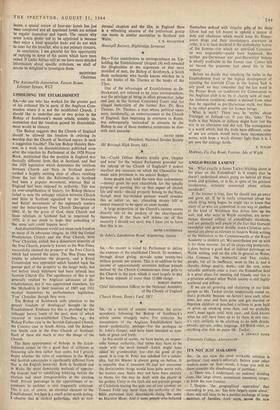SIR,—What exactly is James Tucker bitching about in his piece
on the Eisteddfod? Is it simply that he doesn't understand what's going on behind all those cowls and goloshes, or is he, in spite of his petulant incoherence, seriously concerned about artistic standards?
If the former is true, then he should just go away and grow, up. If he is really concerned about the whole thing being bogus, he might like to know that many of us who are committed in one way or another to the kind of Welshness that drives him up the wall, and who write in Welsh ourselves, are never-' theless damned critical of cisteddfodic standards, and are perfectly well aware of the fact that Gorsedd swordplay• and general druidic mock-Christian cere- monial are about as relevant to modern Welsh writing as the beefeaters to the Commonwealth or the Royal Academy to modern art. We nevertheless put up with it, for three reasons: for all its circus-ring pomposity, it does bestow a good deal of indirect patronage on , Welsh writing, and on the arts in general in Wales; , like. Compact, the monarchy and Test cricket, . people, for all its inefficacy, seem to like it, and it thereby. brings poetry, music,• and the rest, some valuable publicity .once a year; the Eisteddfod field is a great place for meeting old friends, and this is a priceless adjunct when Welsh society is still highly scattered and diffuse..
If we are all grinning and chattering in our little groups as Mr. Tucker circles suspiciously round us, that's probably because we haven't seen each other since last year and have gone and got married or begotten children or poached a salmon or gone bald or given up smoking since then, and we probably won't meet again until next year, and God knows what we will have been up to by filen; in any case, it's very, unlikely to be anything to do with druids, swords; ear-sets, robes, language, All-Welsh rules, or ;, anything else that so pains Mr. Tucker.
R. GERALLT JONES


































 Previous page
Previous page